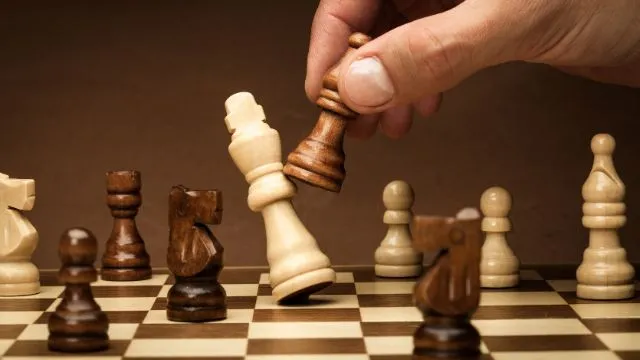Chess is an ancient game that’s still popular, and still keeping minds sharp and strategy wheels turning. From the looks of it, the game of chess seems simple on the surface, right? Sixty-four squares, thirty-two pieces, a no-brainer. But don’t let that fool you. It’s a minefield of cunning tactics and thoughtful strategies. It smashes language barriers and doesn’t care where you’re from, it’s all about the game.
But let’s not sugarcoat it; chess can be both a delight and a dread. It’s been named the “game of kings”, and it’s been a metaphor for, well, pretty much everything: life, war, politics, strategy, you name it. But like anything, it’s got its highs and lows. And today, we’re diving headfirst into the good, the bad, and the ugly of chess. So here we go for the pros and cons of playing chess.
Advantages of Playing Chess

Chess is not just a game, it could be a tool for many things to benefit from in life.
1. Cognitive Benefits
In chess, you gotta predict your opponent’s moves, and to do that, you have to put yourself in their shoes. In other words, you develop the “theory of mind,” a super handy skill for getting along with people in real life. And guess what? Studies suggest that kids who play chess get really good at this. And hey, if you’re into memory games then chess would be another best thing in your life. Chess veterans are like human flash drives, their memories stuffed with countless move combinations and potential outcomes. The need to remember every twist and turn of the game has made them pros at spotting visual patterns super quickly.
2. Mental and Emotional Benefits
If you play chess, you know that there’s nothing quite like getting totally lost in a game of chess. It’s like a high-octane thrill ride for your brain that we like to call the “flow state.” And when you’re in it, you’re performing at your peak. Interesting side note, brain scans show that chess champs in the zone have loads of theta waves going on, signaling some serious focus. Oh, and for all you artists out there, chess might just be your secret weapon for sparking creativity. Some studies show that students who learn chess end up having better creative thinking skills than those who don’t. The game’s nature pushes you to think outside the box, encouraging divergent and imaginative thinking.
3. Skill Development
Chess isn’t just good for your brain, it’s also a stealthy but great way to boost some crucial life skills. Like strategic planning, for instance. Anticipating your opponent’s moves and mapping out your strategy accordingly is pretty similar to figuring out life. In many cognitive tests, it has been seen that regular chess players have better planning skills than non-players.
4. Therapeutic Benefits
Some therapists have started using chess as a cool tool to help people understand themselves better and build stronger therapeutic relationships. In the heat of a chess match, your reactions to stress and challenges get put under a microscope. This can help you learn about how you solve problems and react when put under difficult situations or circumstances.
5. Long-term Health Benefits
Finally, there’s some evidence suggesting that chess might help keep your brain young. All the mental gymnastics involved in the game could shield you against dementia. The constant mental workout that chess provides, testing memory, calculation, spatial skills, and critical thinking, might just slow down cognitive decline and delay dementia as we age.
Disadvantages of Playing Chess
While chess is known for the myriad of perks it offers, it wouldn’t be fair to overlook some of the hitches that come along with this mind-bending game.
1. Complexity and Time Consumption
One of the first bumps you’ll hit when you dive into the world of chess is its intriguing complexity. Sure, the basic rules might seem as easy as pie, but to play like a pro, you’ll need to think like one, and boy, does that take time! Chess champs often spend countless years polishing their tactics and strategies.
2. Limited Player Base
The skill spectrum in chess is as wide as it gets, and hunting down someone who’s on your wavelength can be tough as nails, especially as you keep getting better. That’s because chess skills aren’t something you’re born with, they’re earned through hours and hours of practice. So, if you’re up for a challenging game, a newbie probably won’t cut it.
3. Learning Curve
Let’s be real, chess comes with a web of intricate rules that can be a tough nut to crack for beginners. This steep ascent of learning can sometimes put off folks from really diving deep into the game.
4. The Unforgiving Nature of Chess
Here’s another truth bomb about chess, it’s ruthless! Make a slip, and you can kiss your victory goodbye. Chess games can often feel like you’re walking on a tightrope, thanks to the high-pressure environment. And let’s face it, chess is a skill-based game. If you lose a chess game, that’s on you completely because there is no luck involved. If you lost a chess game, that means you certainly made a mistake at some point in the game, and from then on, it was just a slippery slope.
Conclusion
So, where does that leave us? Well, the pros and cons of chess really boil down to you as the player. It’s about your mindset, how you balance the thrill of the game with, well, everything else going on in your life. And sure, it’s got its downsides. But guess what? Despite all the potential hiccups, chess isn’t going anywhere. So it is better to maintain a balance and you’ll be good for the most part.

Passionate sports content writer, Rocky delves into the world of athletics with a keen eye for detail. With a background in journalism, he transforms moments on the field into compelling narratives that resonate with readers.






